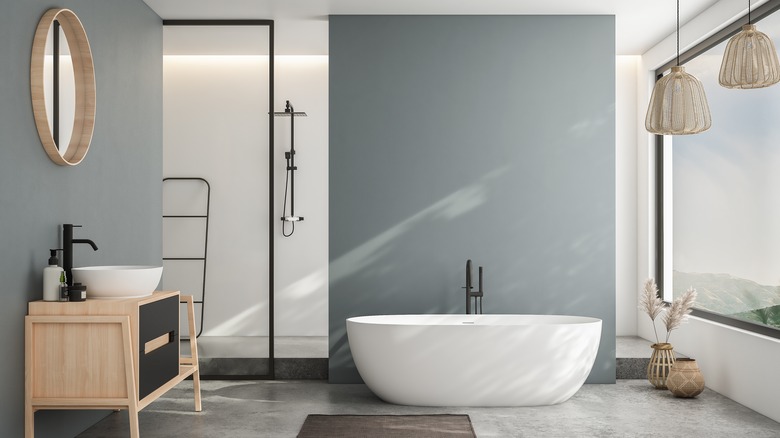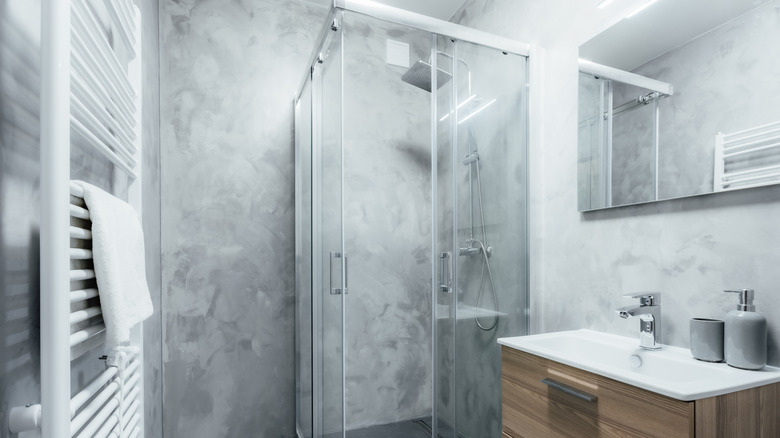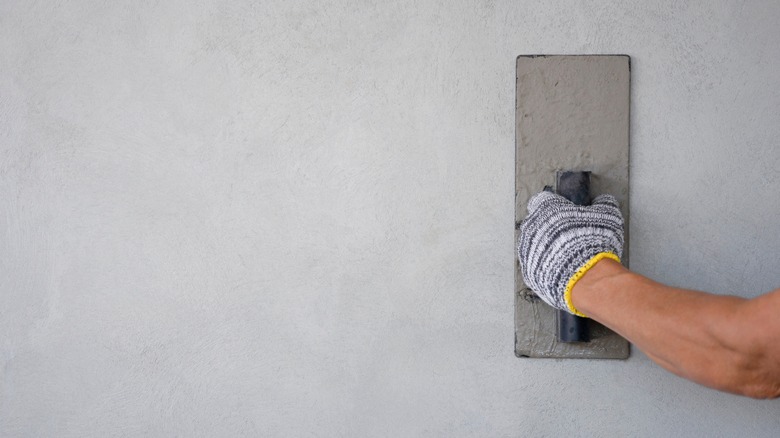Ditch The Shower Tiles And Try This Alternative For A Trendy Bathroom In 2024
Designing a bathroom requires the perfect blend of function and style. Everyone wants a bathroom that feels more like a luxury spa than a space to perform daily hygiene routines. Even in the smallest of spaces, design makes that doable. There's one 2024 bathroom trend that interior designers predict we'll see more of: plaster shower walls as an alternative to tiles. "In 2024, we're going to see less tile in the shower and more of the plastered look," says Linda Hayslett, founder of LH.Designs in an interview with Good Housekeeping. "If Europeans use plaster for their bathrooms and showers without tile, then we're going to see more of that catching on as people don't want to deal with cleaning grout."
For lovers of a clean, modern palette, plaster shower walls produce a minimalist look. With no harsh lines and only subtle textural varieties, it has an aesthetically harmonious, calming visual appeal. As Hayslett notes, plaster removes the hassle of tiling bathroom walls. There's no geometry, tile cutting, grouting, or lippage to worry about. Where tile can be unforgiving if you make a mistake with your tile size, grout thickness, or application angle, plaster comes with none of these headaches. Best of all, with plastered walls, you'll never have to worry about the unsightly appearance and cleaning nightmare that comes with grimy grout. From a design and practicality standpoint, this alternative to shower tile walls is a trend you may want to utilize in your next bathroom remodel.
Should you plaster your shower?
There are definitely some trends to avoid when renovating your bathroom. No matter how good they look online, fad trends like bright bathroom wallpaper and colorful tubs and toilets come and go for a reason. Homeowners realize that trends can be challenging to maintain, make your bathroom feel outdated, or hurt resale value. Plastered shower walls aren't one of these passing fads. It has been used in interior design for millennia. With ease of cleaning in mind, plaster is a clear winner as an alternative to bathroom tile. Because the material is non-porous, it's less likely to absorb moisture in bathroom showers, meaning less mold, mildew, and fungus. The grout that is used between tile joints is naturally porous, making it more susceptible to trapping moisture.
Overall, the tones and texturing make plaster an aesthetically pleasing material for a modern, earthy interior design. From earthen plaster to Venetian limestone, it comes in natural shades of creamy beige, stony sand, and grey. Some variations can also be given a slight tint with pigmented minerals to create richer shades of pink-brown or charcoal black. Plus, Zillow has identified brutalism as their number one hottest home trend for 2024. There's arguably no better shower wall material than plaster to encompass brutalism's raw, modern, minimalist look.
Prepare before you plaster
Plaster is an attractive and practical trend for shower walls, especially as an alternative to tile. Although tiling is arguably more difficult — plastering your shower walls is no simple task, and it's not cheap. Many plaster varieties are on the market, and your choice will likely consider your color, texture, and finish preferences. Tadelakt, Marmorino Venetian, and Pastellone are all popular and shower-safe choices. Coarse varieties are only suitable for outdoor spaces, as they are more likely to hold organic residue from skin and soap and cause mold.
Before you buy plaster walls, know that those in the shower require a waterproof membrane and careful priming. You can plaster over old tiles or backer board, but you'll need to create a flat, uniform surface and prepare the surface with primer, an initial coat of fiber-reinforced plaster, and fiberglass or polyester mesh. This ensures your plaster adheres, doesn't crack over time, and creates a waterproof finish. Only after priming can plaster be applied by hand with a trowel. For most, two to three coats will be needed. Applying a polyurethane varnish or other protective treatment is also necessary, as well as silicone shower sealant around faucets and taps. It's best to enlist expert assistance to plaster walls. Selecting the wrong type of plaster, incorrect preparation, application, or finish could cost time and money. Although it's an initial investment, if done well, your shower walls will be durable, easy to maintain, and aesthetically rewarding for years to come.


